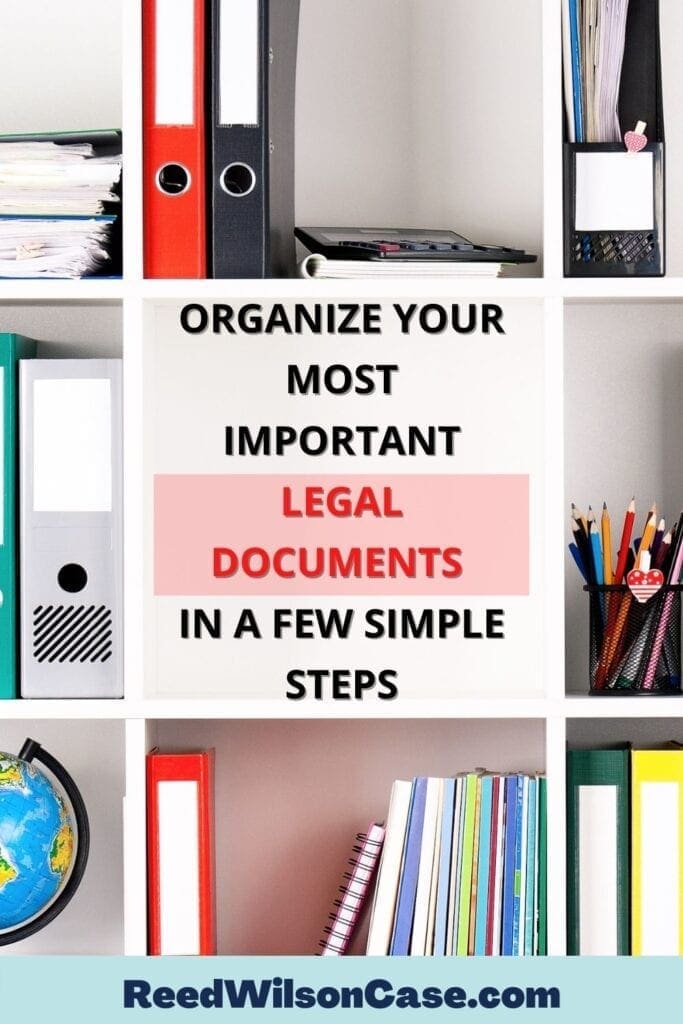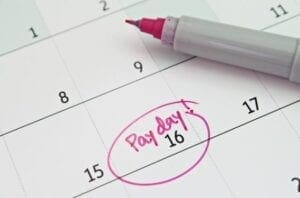A Few Simple Steps To Organize Legal Documents Fast
It may seem like a drag to get organized sometimes, but if there is one thing you are going to dedicate that time to, let that be your legal documents.
These are documents that you rarely need, but cannot risk losing in case of an emergency, like an accident, or tax season. Once you organize legal documents in a way that makes sense to you, it will feel like a weight has been lifted off your shoulders.
 Step 1 – Declutter Your Intake
Step 1 – Declutter Your Intake
The first step to creating an organized home filing system is to cut down on the amount of paper you receive in the first place. That will reduce the amount of paperwork you’ll have to go through and shred, or file.
Unneeded paperwork includes junk mail, flyers, coupons you’ll never use, and magazines you’ll never read. Another good idea is to sign up for e-bills and statements. If you really need to look at something, you can always log in to your online account and print out the necessary documents.
Step 2 – Find All of Your Paperwork – Legal and Otherwise
Before you get to the important task of organizing your legal documents, you have to find them first. Although, that is sometimes easier said than done.
Check your desk drawers and the papers stacked on top of it. Check your kitchen countertops as well as kitchen drawers and baskets. Look on top and inside of your bedroom dresser and nightstand.
Last, but not least, check your wallet, purse, or briefcase for important documents you are probably carrying around.
Step 3 – Gather The Necessary Materials
- Recycling bin
- Shredder
- Label maker or writing utensil
- File folders
- Filing cabinet
- Small Fire Proof Safe
- Hanging files in several colors (with tabs)
- Inbox tray (optional)
- Binder for daily paperwork (Optional)
 Step 4 – Separate Your Papers Into 5 Categories
Step 4 – Separate Your Papers Into 5 Categories
Now it’s time to sort all of your legal documents. Each document will go into one of these five categories:
- Act – Paperwork that you need to take action on immediately. Paperwork such as bills to be paid, invitations to respond to, and appointment reminders to put on the calendar. Once you’ve acted on certain papers – You can then categorize them under Keep Close (i.e. invitations, appointment cards) or File (i.e. paid bills) for future record, until they are no longer needed. You can also include magazines and newspapers you want to read, which can then go into the Recycle pile once you are done with them.
- File – Any Important legal documents you can file away in your filing cabinet and don’t need to reference more than once or twice a year. Including medical records, tax returns & receipts, deed/lease, warranties, contracts, and Personal identification records. (see below – “What are important documents?”)
- Keep Close – Day-to-day paperwork that you use to keep your household (and life) running. Things like coupons, recipes, user manuals, upcoming travel documents, and events.
- Recycle – Any paperwork that is useless to you and contains no personal information. Examples include junk mail and used envelopes.
- Shred – This is where you include papers that don’t fall into the first three categories but do contain personal identifying information. Examples are credit card offers, old bank statements, and bills you no longer need to keep for reference.
Step 5 – Get Rid of Unnecessary Clutter
Now that you have a clear picture in front of you of what needs to be tossed – get rid of it. Grab the recycling pile first, and just drop it into a recycling bin – easy peasy! Next, shred the sensitive legal documents you’re getting rid of – That’s the fun part.
Step 6 – Organize The “File” Pile
First, grab your most important legal documents, such as your passport and social security card, maybe even your birth certificate (If you’re international like me, getting another copy would prove extremely difficult). This is the stuff that goes straight into a fireproof box or safe for protection.
Next, split your documents into subcategories for more efficient organization, such as personal (Identification, marriage license, etc.), academic (diploma, transcripts), transportation (car title & repair receipts), employment (such as a contract), financial (Tax documents, paid bills), health (medical records), Legal (Will, POA, and other estate planning documents), and real estate (Title, deed, lease agreement, repairs). Use the labeled file folders for each of your subcategories, then put those folders into the filing cabinet for easy access.
Step 7 – Organize Your “Keep Close” Pile
Now it’s time for your daily paperwork pile. You can keep these papers in file folders stored in the filing cabinet along with your other important documents OR in a binder with various sections and pockets.
The main benefit of a binder is that it doesn’t take up much space, and it can be kept anywhere and moved around to wherever you need it.
Binder sections can include coupons, vouchers, and gift cards; receipts you’re still referencing; rewards and loyalty cards; user manuals you occasionally need to check. Divide the paperwork into categories that best fit your lifestyle and your day-to-day schedule.
Step 8 – Set Up The Action File
Last but not least, your action category of the paperwork. Because these papers involve items that need to be dealt with right away, it will be helpful to keep them out in the open as a visual reminder for yourself, rather than hidden away in a filing cabinet.
Out of sight, out of mind, as they say. An inbox tray can be a good option for storing action paperwork so that you’ll always see if anything needs to be done.
Plan to go through the tray at least once a week. Then you should recycle or shred the items you’re done with and put away anything you need to keep into your “keep Close” or “File” piles.
The goal is to keep your action file as small as possible. That way you won’t get overwhelmed and procrastinate – That’s when things start to pile up and get disorganized again.
 Extra Tip – Duplicate Your Wallet
Extra Tip – Duplicate Your Wallet
Given the fact that we carry personal and crucial information like our insurance cards and credit cards in our wallets, we would be greatly inconvenienced if it were lost or stolen.
Even if you can easily get replacements, they’re not going to magically show up in your hands the second you lose them. Having those essential numbers in your possession before you get new cards could be a lifesaver in certain cases.
Make copies of your driver’s license, health insurance cards, organ donor card (if you have one), membership cards, and, most important, all credit and debit cards (copy front and back).
Keep these copies with your other important paper documents in your filing cabinet.
What Are Important Documents?
Important documents are the ones you need to keep safe either forever or until they are no longer useful. You will probably need them pretty rarely unless a big life event happens, like getting married, buying a house, having a baby, changing your name, or making a will.
But it’s in those important moments in time that you’ll realize you should probably start keeping these documents somewhere you can easily find them. These documents include:
-
Legal Identification Documents
- Social Security cards
- Birth certificates or adoption papers
- Marriage licenses or divorce decrees
- Passports and/or citizenship papers
- Death certificates of family members
How Long Should I Keep My Personal Documents?
Personal documents might include your birth certificate, your children’s birth certificates (if they’re little), marriage license or divorce certificate, Social Security cards, retirement accounts, life insurance documents, last will and testament, healthcare directive, and powers of attorney. You need to keep all of these things – forever!
Your birth certificate, living will, and Social Security card matter most while you are still alive. On the other hand, legal documents like your will, powers of attorney, and life insurance policies help your loved ones make the proper arrangement after you’re gone.
You don’t want your loved ones to have to look around for crucial documents and try to figure out what they should do with your personal property.
If you don’t currently have documents like your Will or POA, now is the time to get on that. You would benefit from an entire Estate Plan set up, that would cover you in any financial or health situations.
Please refer to our Estate Planning page to get a little more information about our services.
Remember to shred any document with personal information on it before you toss it in the dumpster. You never know who could get their hands on it!
-
Tax documents
- Tax returns
- W-2s and 1099 forms
- Any tax-related forms, receipts, and records
How Long Should I Keep My Tax Statements?
Seven years! You never know when you might need them. Maybe the IRS wants to do an audit. Maybe you’ll be buying a new house and need to prove you’ve been a responsible human in the finance department. You never know, so it’s best to keep anything tax-related around . . . just in case.
-
Property records
- Vehicle registration and titles
- Mortgage statements, deeds, and bills of sale
- Insurance policies (home, auto, personal property, etc.)
How Long Should I Keep Property Records?
You should really keep things like registration and titles, deeds, mortgage statements, and even insurance policies for as long as you own your property.
-
Medical Records
- Wills, powers of attorney, and living will
- Medical bills
- Burial instructions
- Health insurance policies
How Long Should I Keep My Medical Records?
The Federal Trade Commission suggests keeping your paid medical bills for at least one year. We’re all human and sometimes people make mistakes. Maybe that intern at the hospital’s billing department hasn’t mastered the billing system yet, so you may or may not receive the same bill twice.
Your medical bills are a record of what you’ve paid and will come in handy with any dispute situations. And if you haven’t paid or are disputing the bill, you’ll want to keep them until the dust settles and everything is resolved.
-
Financial records
- Pay stubs
- Canceled checks and copies of used checks
- Disability or unemployment records
- Retirement/pension plan records
- Investment statements
- Recent bank account statements
 How Long Should I Keep My Bank Statements and Paycheck Stubs?
How Long Should I Keep My Bank Statements and Paycheck Stubs?
Bank statements: What are they even good for? It’s tempting to chuck them right as soon as you get them. But not so fast! They’re actually really great for seeing all of your monthly transactions in one tidy place.
So the next time you get one of these bad boys in the mail, take a few minutes and look for anything out of the ordinary.
Another great reason to file your monthly bank statement is for probate purposes. If anything ever happens to you, the administrator of your estate (that you will name in your last will and testament) will need to submit bank account records as of the date of death to the probate court.
Having an easily accessible report of all your bank accounts and recent statements along with your other legal documents would make things much easier, in a not so easy situation.
As to not accumulate paperwork that might be confusing, get rid of the previous monthly bank statement as soon as you get a new one. And by get rid of it, I really mean shred it to pieces.
The same goes for all those pay stubs. You might need these to provide proof of income for when you need to make a big purchase or to dispute any suspicious behavior (like identity theft). keep your paycheck stubs for a year, then straight to the shredder.
If both your bank statements and paycheck stubs are only sent electronically (as most things are these days), print out a page naming all your bank accounts with the associated bank account numbers. As well as the login information to your payroll account.
How Long Should I Keep My Utility Bills?
Not long. if you know you’ll need to bring your proof of residence to the DMV, you’ll want to have last month’s utility bills with your name and address front and center. Otherwise, throw it into the shred pile.
How Long Should I Keep My Receipts?
- If you’re working from your home office, doing home improvements, or anything else you might get a tax credit on, you’ll need those receipts for proof. Feel free to shred them after tax season is over.
- Warranty records, receipts for big-ticket items (like a new TV or dryer), and proof of home repairs – those you should keep around until the warranty expires, you sell the appliance in question, or move out of your house.
- Now let’s talk about all your other receipts! There are so many rebate apps out there that will save you money on everything you buy. Apps like Fetch Rewards – where you get points for any receipt just by scanning it and you can redeem them for gift cards to tons of places. My favorite grocery store rebate app has to be ibotta – add rebates to your account in the app, scan your receipts, and watch actual cash back roll in. Once you’ve scanned all your receipts – shred, shred, shred.
Ongoing Maintenance
Once you have a good system in place for incoming mail, and your important papers are organized, keep them that way. Each month when you pay your bills, file any new documents in the appropriate section of your filing system.
At least twice a year, review the documents in your filing system to see if any can be purged. A good schedule to follow is at the first of the calendar year and at the end of each school year.
Disclaimer: The information provided in this article does not, and is not intended to, constitute legal advice and is for general informational purposes only.
Let Us Know How We Can Help!
Please fill in your contact information and a brief message about what you need help with. A consultation will need to be scheduled in order to provide legal guidance.
Marketing & Technology Director at RWC, LLC, Attorneys & Counselors at Law
Ukraine born and Israel / Miami, FL raised. University of Miami graduate in the Marketing field.
Mom to a girl, a boy, and a Siberian Husky.







